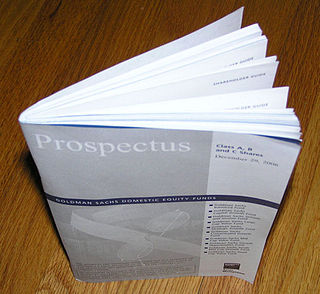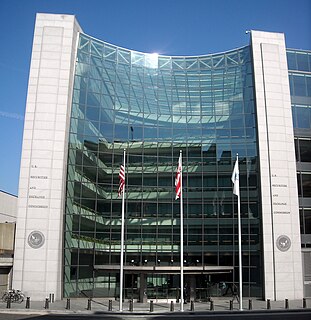
The U.S. Securities and Exchange Commission (SEC) is an independent agency of the United States federal government, created in the aftermath of the Wall Street Crash of 1929. The primary purpose of the SEC is to enforce the law against market manipulation.

The Sarbanes–Oxley Act of 2002 is a United States federal law that mandates certain practices in financial record keeping and reporting for corporations.

The Securities Act of 1933, also known as the 1933 Act, the Securities Act, the Truth in Securities Act, the Federal Securities Act, and the '33 Act, was enacted by the United States Congress on May 27, 1933, during the Great Depression and after the stock market crash of 1929. It is an integral part of United States securities regulation. It is legislated pursuant to the Interstate Commerce Clause of the Constitution.

An American depositary receipt is a negotiable security that represents securities of a foreign company and allows that company's shares to trade in the U.S. financial markets.

The Securities Exchange Act of 1934 is a law governing the secondary trading of securities in the United States of America. A landmark of wide-ranging legislation, the Act of '34 and related statutes form the basis of regulation of the financial markets and their participants in the United States. The 1934 Act also established the Securities and Exchange Commission (SEC), the agency primarily responsible for enforcement of United States federal securities law.

Pier 1 Imports, Inc. is an online retailer and former Fort Worth, Texas-based retail chain specializing in imported home furnishings and decor, particularly furniture, table-top items, decorative accessories, and seasonal decor. It was publicly traded on the New York Stock Exchange under ticker PIR. As recently as January 2020, Pier 1 had over 1,000 physical stores throughout the United States and Canada. Pier 1 filed for Chapter 11 bankruptcy protection on February 17, 2020, and on May 19, 2020, announced it was asking the bankruptcy court to close all stores, due in large part to the COVID-19 pandemic.
Bank regulation is a form of government regulation which subjects banks to certain requirements, restrictions and guidelines, designed to create market transparency between banking institutions and the individuals and corporations with whom they conduct business, among other things. As regulation focusing on key factors in the financial markets, it forms one of the three components of financial law, the other two being case law and self-regulating market practices.
A Form 10-K is an annual report required by the U.S. Securities and Exchange Commission (SEC), that gives a comprehensive summary of a company's financial performance. Although similarly named, the annual report on Form 10-K is distinct from the often glossy "annual report to shareholders," which a company must send to its shareholders when it holds an annual meeting to elect directors. The 10-K includes information such as company history, organizational structure, executive compensation, equity, subsidiaries, and audited financial statements, among other information.
OTC Markets Group is an American financial market providing price and liquidity information for almost 10,000 over-the-counter (OTC) securities. The group has its headquarters in New York City. OTC-traded securities are organized into three markets to inform investors of opportunities and risks: OTCQX, OTCQB and Pink.

Securities regulation in the United States is the field of U.S. law that covers transactions and other dealings with securities. The term is usually understood to include both federal and state-level regulation by governmental regulatory agencies, but sometimes may also encompass listing requirements of exchanges like the New York Stock Exchange and rules of self-regulatory organizations like the Financial Industry Regulatory Authority (FINRA).

A prospectus, in finance, is a disclosure document that describes a financial security for potential buyers. It commonly provides investors with material information about mutual funds, stocks, bonds and other investments, such as a description of the company's business, financial statements, biographies of officers and directors, detailed information about their compensation, any litigation that is taking place, a list of material properties and any other material information. In the context of an individual securities offering, such as an initial public offering, a prospectus is distributed by underwriters or brokerages to potential investors. Today, prospectuses are most widely distributed through websites such as EDGAR and its equivalents in other countries.
An earnings call is a teleconference, or webcast, in which a public company discusses the financial results of a reporting period. The name comes from earnings per share (EPS), the bottom line number in the income statement divided by the number of shares outstanding. The US-based National Investor Relations Institute (NIRI) says that 92% of companies represented by their members conduct earnings calls and that virtually all of these are webcast. Transcripts of calls may be made available either by the company or a third party.
W. W. Grainger, Inc. is an American Fortune 500 industrial supply company founded in 1927 in Chicago by William W. (Bill) Grainger. He founded the company in order to provide consumers with access to a consistent supply of motors. The company now serves more than 3 million customers worldwide with offerings such as motors, lighting, material handling, fasteners, plumbing, tools, and safety supplies, along with inventory management services and technical support. Revenue is generally from business-to-business sales rather than retail sales. Grainger serves its over 3 million customers through a network of approximately 598 branches, online channels, and 33 distribution centers.
Form 8-K is a very broad form used to notify investors in United States public companies of specified events that may be important to shareholders or the United States Securities and Exchange Commission. This is one of the most common types of forms filed with the SEC. After a significant event like bankruptcy or departure of a CEO, a public company generally must file a Current Report on Form 8-K within four business days to provide an update to previously filed quarterly reports on Form 10-Q and/or Annual Reports on Form 10-K. Form 8-K is required to be filed by public companies with the SEC pursuant to the Securities Exchange Act of 1934, as amended.

FIS is an American multinational corporation which offers a wide range of financial products and services. FIS is most known for its development of Financial Technology, or FinTech, and as of Q2 2020 it offers its solutions in three primary segments: Merchant Solutions, Banking Solutions, and Capital Market Solutions. Annually, FIS facilitates the movement of roughly $9 trillion through the processing of approximately 75 billion transactions in service to more than 20,000 clients around the globe.
The uniform net capital rule is a rule created by the U.S. Securities and Exchange Commission ("SEC") in 1975 to regulate directly the ability of broker-dealers to meet their financial obligations to customers and other creditors. Broker-dealers are companies that trade securities for customers and for their own accounts.
Camelot Entertainment Group, Inc. ("CMGR"), is a public company based in Irvine, California with three subsidiaries: Camelot Films, Camelot Distribution Group, including DarKnight Pictures, and Camelot Studio Group. Camelot is in the process of rebuilding its production and distribution subsidiaries as it continues to work on its Studio Group developments. As of March 1, 2018, Camelot is working toward filing a new S-1 Registration Statement in order to regain its fully reporting status and resume trading. The company has not traded since July 23, 2013, when it was unable to complete its annual and quarterly filing requirements due to lack of funding. In the interim, the company has divested itself of most of the titles it was representing for distribution as part of an overall restructuring. In addition to divesting the film library acquired in 2010, the company has now worked through most of the prior legal issues that arose from the acquisition of the library and is now in a position to move forward with its S-1 Registration. Going forward, Camelot will focus on acquiring and producing content through its Camelot Films subsidiary, direct to consumer ("DTC") digital distribution domestically as it rebuilds its foreign sales operations through its Camelot Distribution Group subsidiary, and the launch of its long planned Camelot Studio Group facility.
Regulation S-K is a prescribed regulation under the US Securities Act of 1933 that lays out reporting requirements for various SEC filings used by public companies. Companies are also often called issuers, filers or registrants.
Regulation S-X is a prescribed regulation in the United States of America that lays out the specific form and content of financial reports, specifically the financial statements of public companies. It is cited as 17 C.F.R. Part 210; the name of the part is "Form and Content of and Requirements for Financial Statements, Securities Act of 1933, Securities Exchange Act of 1934, Public Utility Holding Company Act of 1935, Investment Company Act of 1940, Investment Advisers Act of 1940, and Energy Policy and Conservation Act of 1975".

The U.S. Securities and Exchange Commission (SEC) whistleblower program went into effect on July 21, 2010, when the President signed into law the Dodd-Frank Wall Street Reform and Consumer Protection Act. The same law also established a whistleblower incentive program at the Commodity Futures Trading Commission to incentivize reporting of violations of the Commodity Exchange Act, which is run by former senior SEC enforcement attorney Christopher C. Ehrman. The SEC Whistleblower Program rewards people who submit tips related to violations of the federal securities laws. The program offers robust employment protections, monetary awards and the ability to report anonymously. SEC whistleblowers are entitled to awards ranging from 10 to 30 percent of the monetary sanctions collected, which are paid from a replenishing Investor Protection Fund. Since 2011, whistleblower tips have enabled the SEC to recover over $4.8 billion in financial penalties from wrongdoers. The SEC has awarded more than $1 billion to whistleblowers. The largest SEC whistleblower awards to date are $114 million, $110 million, and $50 million.








